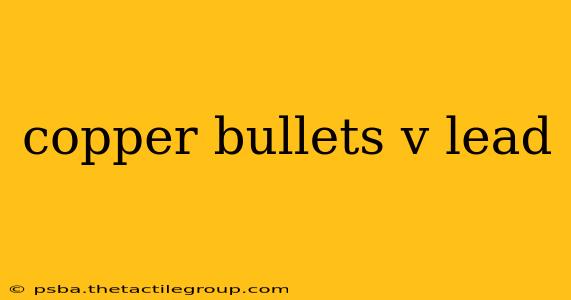Choosing the right ammunition is crucial for any hunter or shooter, and the debate between copper bullets and lead bullets is a long-standing one. Both have their advantages and disadvantages, making the "best" choice dependent on individual needs and priorities. This in-depth comparison will explore the key differences between copper and lead bullets, helping you make an informed decision.
Key Differences: Copper vs. Lead Bullets
The fundamental difference lies in the material: lead, a relatively soft and dense metal, has been the mainstay of bullet manufacturing for centuries. Copper, a harder and more expensive metal, is increasingly popular due to its unique properties.
Lead Bullets:
- Pros:
- Cost-effective: Lead is significantly cheaper than copper, making lead bullets a budget-friendly option.
- High density: Lead's density contributes to high stopping power at shorter ranges.
- Easy to cast: This allows for greater customization and affordability for reloaders.
- Cons:
- Environmental concerns: Lead is toxic, posing risks to wildlife and the environment through soil and water contamination. This is a significant factor for many hunters and conservationists.
- Fouling: Lead bullets leave more residue in the barrel, requiring more frequent cleaning.
- Lower ballistic coefficient: Generally, lead bullets have a lower ballistic coefficient compared to copper, meaning they are more affected by air resistance, impacting accuracy at longer ranges.
Copper Bullets:
- Pros:
- Environmentally friendly: Copper is non-toxic and biodegradable, making it a more environmentally responsible choice.
- Superior ballistic coefficient: Copper bullets typically boast a higher ballistic coefficient, resulting in flatter trajectories and better accuracy at longer ranges. This is crucial for precision shooting and hunting at extended distances.
- Less fouling: Copper bullets produce significantly less fouling, leading to less barrel cleaning and potentially longer barrel life.
- Superior fragmentation (in some designs): Certain copper bullet designs are engineered for controlled expansion and fragmentation, offering enhanced stopping power and lethality on game.
- Cons:
- Higher cost: Copper is more expensive than lead, resulting in a higher price per bullet.
- Potential for overpenetration: The high density and retention of some copper bullets can lead to overpenetration in certain situations. This is a key consideration for hunting in populated areas.
Factors to Consider When Choosing
Your choice between copper and lead ammunition depends heavily on your specific application:
Hunting:
- Game Type: For larger game at longer ranges, the superior ballistic coefficient and accuracy of copper bullets might be preferred. For smaller game at closer ranges, the cost-effectiveness of lead might be more appealing.
- Hunting Location: In areas where environmental concerns are paramount, copper bullets are the more responsible choice.
- Regulations: Some hunting areas have regulations restricting the use of lead ammunition to protect wildlife. Always check local and regional regulations before heading out.
Target Shooting:
- Range: For long-range target shooting, the accuracy advantage of copper bullets is significant.
- Budget: The cost difference might be a major factor for high-volume target shooters.
Conclusion: The Verdict Isn't One-Size-Fits-All
The "best" bullet—copper or lead—depends entirely on the context. Lead bullets remain a cost-effective and readily available option, particularly for short-range shooting and hunting smaller game. However, copper bullets are increasingly popular due to their environmental benefits, superior ballistic performance, and reduced fouling. Weigh the pros and cons carefully, considering your specific needs and priorities, to make the most informed decision for your hunting or shooting activities. Understanding the implications of your choice—both practically and ethically—is key to responsible and effective shooting.

